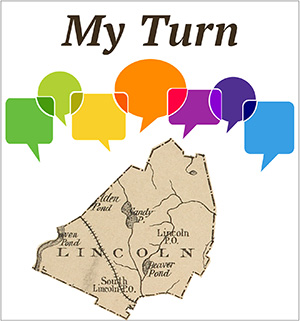By Edward Young
Although the moderator said that none of the controversial procedures followed at [Saturday’s] Town Meeting should be considered as precedents, they raise questions that should be addressed when the town considers Town Meeting procedures comprehensively later this year, if not sooner. Here is how the moderator regulated who spoke, when and where.
Prior to the meeting, the moderator had announced that a group of over 300 residents — who had petitioned for time for a spokesperson to speak from the podium, with slides, in opposition to voting now on the announced resolution regarding a draft HCA bylaw nine months before the deadline for HCA compliance — would instead speak for ten minutes from microphones in the auditorium, without slides, and that a spokesperson for another group of residents who favored voting on the resolution now would be allowed to speak in the same manner. Presumably, only town officials and members of town advisory committees, all of whom favored immediate adoption of the resolution, would be allowed to speak from the podium or present slides.
Two members of the Planning Board who had voted against the draft bylaw in its current form also asked to be able to speak from the podium, as their three fellow Planning Board members who had voted in favor were allowed to do without time limit. This was denied, and they were restricted to getting in line for two minutes each at the microphone. Instead of allowing the two members to say themselves whatever they wanted to say from the podium, in their own tone of voice and in the fresh context of whatever was being said at the meeting, another Planning Board member chose to read aloud, in their own tone of voice, a public statement that the two members had made some weeks before.
Neither group of residents, nor the two Planning Board members, has any financial stake in the outcome of the HCA vote.
However, before either group was allowed to speak, the Rural Land Foundation — which is not a part of town government, and which has a financial stake of millions of dollars in the outcome of the HCA vote — was allowed to speak from the podium, with slides. This came as a complete surprise to the voters in the auditorium.
By being recognized first, the RLF was enabled to move a detailed amendment to the HCA resolution that precluded discussion of the main motion for quite some time. The RLF flashed on the screen a series of highly complicated charts that were not handed out before the meeting and which voters had not had a chance to review.
After the amendment had been discussed and voted on, the two groups of residents were finally allowed to speak on the (amended) main motion. The opponents of the motion were called on first and the proponents had the chance to rebut what they said. It would be interesting to know if that order of speaking was decided by coin flip or other neutral method.
The two Planning Board members were patient enough to eventually make it through the microphone line for two minute comments.
That’s how discussion was handled at Town Meeting.
So I submit that a robust examination of the fairness or unfairness of what just happened at Town Meeting is very much in order. I wonder if anyone would care to provide reasons in justification for it?
“My Turn” is a forum for readers to offer their letters to the editor or views on any subject of interest to other Lincolnites. Submissions must be signed with the writer’s name and street address and sent via email to lincolnsquirrelnews@gmail.com. Items will be edited for punctuation, spelling, style, etc., and will be published at the discretion of the editor. Submissions containing personal attacks, errors of fact, or other inappropriate material will not be published.

Thank you for this analysis.
As mentioned here a petition of 300+ residents asked the powers that be to allow a representative from the established group Lincoln Residents for Housing Alternatives (LRHA) to speak from the Podium about their No for Now, take the time to unite Lincoln position. The Moderator denied it.
Through the LRHA podium time denial and the disadvantage in mic order process, a person speaking as a rep for LRHA was named. Two Planning Board elected officials and the Agricultural Commission (AgCom) also asked for Podium time but because they had No for Now positions were also denied. (To find out why Podium time was deemed important, watch the recording of the 3/18 Select Board meeting.)
As a result of the Podium time requests/denials, there were three known No for Now parties with representatives (LRHA, two elected Planning Board members, AgCom). Yet, those parties, like many, were surprised by the RLF Amendment.
If No for Now parties were taken by surprise, as were many voters, who did the RLF/Planning Board team that planned the Amendment from the Podium presentation compromise with?
I heard a Select Board member say many times the driving force for the Option C plan was to help the RLF. Once the RLF Board decided it no longer needed 25 units per acre density to sell the Mall, the Planning Board could have stepped back to revise the big picture given the driving force for Option C had now changed. Including Codman Road and town-owned land among the 38 total properties to be rezoned, to help the RLF, could now perhaps be reconsidered, too. But that was not to be.